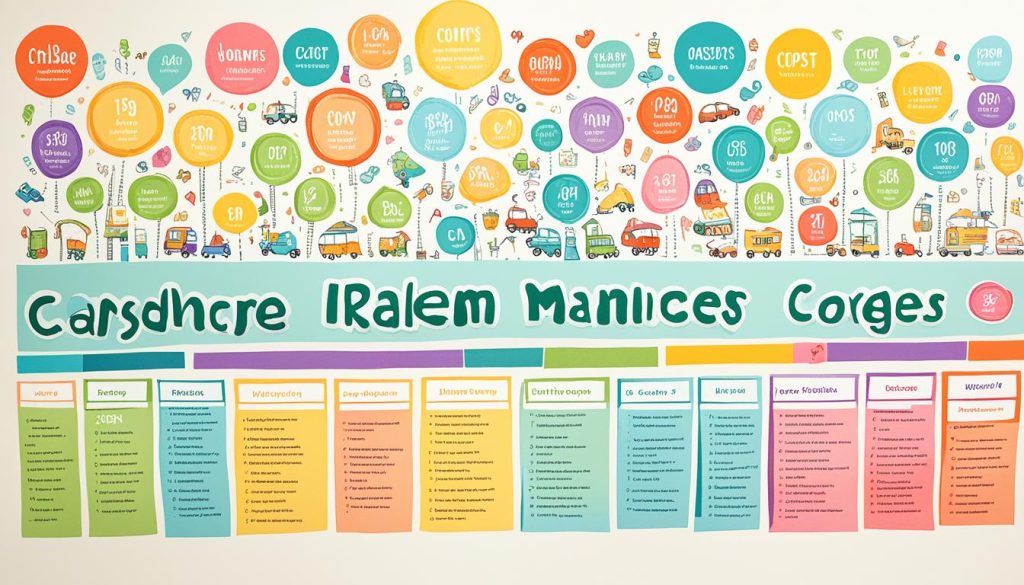Welcoming a new family member is thrilling and fulfilling, but it also means big financial changes. As you start this journey, it’s key to plan your finances well. This guide will show you how to get ready financially for parenthood and deal with the costs it brings.
Key Takeaways
- Make a detailed budget that covers the costs of raising a child, like diapers, formula, healthcare, and education.
- Save for your child’s future, including college tuition and other big goals.
- Learn about healthcare costs during pregnancy and childbirth. Make sure you have good health insurance.
- Look into childcare costs, such as daycare, nannies, and in-home care.
- Think about getting life insurance and planning your estate for your family’s safety.
Understanding the Financial Implications of Parenthood
Becoming a parent changes your life in big ways, bringing joy and big financial responsibilities. New parents must think about the costs of raising a child and saving for their education. Let’s look at how to budget for a baby and plan for their future financially.
Budgeting for Baby: Essential Costs to Consider
Before the baby comes, check your finances and make a budget. Look at your debt, start saving for emergencies, and avoid spending too much before the baby arrives1. After the baby is born, you’ll need to adjust your budget for childcare, healthcare, and other needs1. It’s smart to find out the average costs in your area to be ready for parenthood’s financial side2.
Saving for Your Child’s Future: Education and Beyond
Planning for your child’s future is key, especially for education. A four-year college education can cost between $98,440 at a public university and $197,280 at a private one3. Consider a 529 college savings plan and ask friends and family for contributions instead of gifts3. Saving for your child is important, but don’t forget to plan for your own retirement too.
| Monthly Savings | Estimated College Savings by Age 18 |
|---|---|
| $100 | $38,735 |
| $200 | $77,471 |
| $300 | $116,208 |
| $400 | $154,941 |
This table shows how regular savings can grow over time, assuming a 6% return, compounded monthly3.
“The key to financial security for your family is to start planning early and make smart decisions that balance the needs of your children with your own long-term financial goals.”
Understanding the costs of parenthood and planning financially can secure your family’s future132.
Managing Costs During Pregnancy and Childbirth
Welcoming a new baby is exciting but can also be costly. Pregnancy and childbirth bring big expenses like healthcare costs and hospital bills4. The total cost to raise a child from birth to age 18 is about $296,684, or $17,500 a year4. It’s key to know your health insurance and what you might pay out-of-pocket.
Health Insurance Coverage and Out-of-Pocket Expenses
Health insurance is crucial for covering pregnancy and childbirth costs5. Even with insurance, having a baby is expensive5. Look into Medicaid and financial help programs to manage costs and get the care you need5. About 80% of U.S. companies offer maternity leave, which helps with costs5. Remember to plan for extra expenses like childcare and diapers for years to come.
6 In the U.S., employers must give 12 weeks of unpaid family leave6. Short-term disability insurance can help with income during maternity leave6. Experts suggest having an emergency fund for six months of expenses6. Babies need many doctor visits, which can affect insurance costs and deductibles6. Choosing in-network doctors can lower your bills.
“Planning for a single-income household may involve replacing employer-provided benefits and ensuring an emergency fund is in place with six months’ worth of expenses.”6
Knowing your health insurance and exploring ways to cover pregnancy and childbirth costs helps prepare for parenthood. This way, you can ensure your family gets the care they need.
How to Financially Prepare for Parenthood
Getting ready for the money side of having kids means planning well. First, make a budget that covers things like diapers, formula, clothes, and doctor visits7. Studies show raising a kid from birth to 17 costs about $233,610 in the U.S8.. Also, a healthy birth costs around $9,700, but a C-section can be $12,5008.
It’s key to save for emergencies too. Experts say save three to six months’ expenses or at least $1,200 for surprises7. This helps you stay afloat during tough times like losing a job or unexpected medical bills.
Look into tax breaks for parents, like the Child Tax Credit and Earned Income Tax Credit. These can ease the burden of raising a child7.
Make a savings plan and keep putting money into retirement accounts, even when money is tight9. Aim to save enough to get a full employer match to secure your family’s future.
Lastly, talk to financial experts who know about parenting finances. They can offer advice and plans to meet your financial goals and safeguard your family’s future.
“Preparing for parenthood financially is not just about budgeting for the immediate costs – it’s about building a solid foundation for your family’s long-term financial well-being.”9
By being proactive and following these tips, you’ll be ready for the money side of parenting. This ensures a secure future for your family.
Childcare Costs: Daycare, Nannies, and Other Options
As a new parent, the world of childcare can be both exciting and overwhelming. The cost of daycare, nannies, and other care options varies a lot. It’s key to look into your options and understand the financial help available. By checking out tax benefits and credits for parents, you can lower these big costs and make childcare more doable.
Tax Benefits and Credits for Parents
The Child and Dependent Care Tax Credit is a big help for parents. It can give you a refund of up to $2,000 per child, helping with the high cost of childcare10. Many employers also offer Flexible Spending Accounts (FSAs), letting you save up to $5,000 tax-free for childcare11. Low-income parents might also get the Earned Income Tax Credit (EITC) for extra help11.
There are more than just tax credits and deductions for working parents11. Some cities and states have free preschool for kids 3 to 5, and military families can get federal child care help11. Nonprofits like churches and YMCAs might offer childcare at a lower cost11.
| Childcare Option | Average Annual Cost |
|---|---|
| Infant Daycare in the US | Over $10,50010 |
| Daycare in New York City | Over $24,00010 |
| Daycare in San Francisco | More than $25,00010 |
| Hiring a Nanny in the US | $28,00010 |
| Hiring an Au Pair in the US | Around $21,00010 |
Looking into other childcare choices, like a nanny share or part-time care, can also cut costs11. More employers are now offering money help and backup care programs for their workers’ childcare needs11. Using these resources and tax credits can help parents manage the big cost of childcare.
Choosing a daycare, a nanny, or something else requires understanding the costs and support out there. By researching your childcare choices and the tax benefits and credits, you can keep your family’s finances secure as you start your parenting journey101112.
Protecting Your Family: Life Insurance and Estate Planning
It’s key to protect your family’s financial future with life insurance and estate planning. Life insurance can be a safety net for your loved ones if something unexpected happens13. A Guardian study found 20 percent of working Americans lack a solid financial plan, showing how crucial it is for parents to plan financially14. Sadly, only 60% of parents have life insurance, leaving many families at risk if something unexpected happens.
Estate planning is also crucial for your family’s future. Making a will, choosing guardians for your kids, and setting up an estate plan can give you peace of mind14. About 64% of adults don’t have a will, highlighting the need for estate planning and choosing guardians.
Families with special needs children must be careful not to save too much in their name to avoid losing government services like Social Security Income and Medicaid.13 Also, starting a college savings plan early is key, as the cost of four years of college is about $50,000 for in-state public schools for 2021 graduates14.
When picking life insurance, think about your family’s needs, your income, and your financial goals15. Life insurance can help support your child’s lifestyle and education if you pass away unexpectedly.
Estate planning is just as important. This means making a will, picking guardians, and making sure your assets go where you want them to15. When choosing a guardian, look at their parenting skills, where they live, their finances, values, and health to avoid legal issues.
By focusing on life insurance and estate planning, you can give your family peace of mind and make sure they’re cared for, no matter what the future brings131415.
| Life Insurance Considerations | Estate Planning Essentials |
|---|---|
|
|
“Preparing for the unexpected is the best way to secure your family’s future. Life insurance and estate planning are essential tools to protect your loved ones.”
In conclusion, making sure your family is financially secure is a key part of being a responsible parent. By investing in life insurance and estate planning, you can ensure your loved ones are taken care of, even when the unexpected happens131415.
Financial Planning for Long-Term Goals
Being a parent means you have new financial responsibilities. It’s key to think about your family’s future goals, like saving for college and other big events. By planning ahead, you make sure your family’s future is secure and your child has what they need to succeed.
Saving for College and Other Milestones
Saving for college is a big goal for many parents. Look into 529 college savings plans to help you save for your child’s education16. These plans let you put money aside before taxes, which grows and comes out tax-free for school costs.
Don’t forget about other big events like weddings, down payments on a home, or your child’s future wedding17. Saving now means you won’t stress over these costs later.
Remember, saving for your child’s goals is just part of the picture. Make sure to save for your own retirement too17. Put money into retirement accounts like IRAs or 401(k)s for a secure future for you and your family.
Planning for the long term means looking at both your family’s now and its future. This way, you create a financial plan that covers everything17.
“The key to successful long-term financial planning is to start early and stay disciplined. Investing in your child’s future while also prioritizing your own retirement can help ensure your family’s financial security for years to come.”
Financial planning for parents is a continuous process. Keep up with changes, get advice when you need it, and keep focusing on your family’s financial health18.
- Put money into a 529 college savings plan for your child’s education.
- Look into IRAs and 401(k) plans for your retirement and your family’s future goals.
- Check and update your financial plan often to match your family’s changing needs and goals.
Conclusion
Getting ready for the money side of having kids means planning well. You should budget for big costs like the $237,482 needed from birth to age 1819. Also, save for your child’s future, like college costs, to keep your family financially stable19.
Handling healthcare costs during pregnancy and childbirth is key. Make sure you know your health insurance well. Also, save an emergency fund with enough money for three to six months19. This helps with unexpected costs.
Using tax benefits and credits for parents can also help lower the cost of raising a child20. Getting advice from a financial expert and teaching your kids about money is crucial. This way, you can handle the money side of parenting well and teach your family good money habits20. With good planning and action, you can make sure your family is financially secure for the future and give your child a great start.
FAQ
What is the Health and Human Services Commission (HHSC) in Texas responsible for?
What are some of the significant financial responsibilities that come with becoming a parent?
How can you manage the costs of pregnancy and childbirth?
What are some essential steps to financially prepare for parenthood?
What are the key considerations for childcare costs?
How can you secure your family’s financial future?
How can you save for your child’s long-term financial goals?
Source Links
- How to financially prepare for parenthood
- Budgeting for Parenthood: Prepare Financially for a Growing Family – Milli Bank
- The Joys and Financial Challenges of Parenthood Grove Bank & Trust
- Here’s A Nine-Month Plan to Get Your Finances In Check Before Baby Arrives
- Preparing for a Baby? Tackle These 15 Financial Tasks – NerdWallet
- How to financially prepare for a baby | MassMutual
- Pregnancy Money Moves: Financial Steps for Expecting and New Parents
- How to Financially Prepare for Your First Year of Parenthood
- 4 Steps to Financially Prepare for Parenthood | Financial Gym
- Bringing up baby: tips to manage childcare expenses – Plenty
- 14 Savvy Strategies to Reduce Child Care Costs
- Financial Planning for the Costs of Childcare and Medical Expenses. | American SPCC
- Why financial planning should be part of your family planning – Living Confidently
- Planning for Parenthood: Financial Tips for Expecting Parents | Bank of Hillsboro
- Preparing for Parenthood
- 7 Ways to Financially Plan for Baby
- Starting a family? Take these 10 steps to prepare financially
- 6 Financial Planning Tips for New Parents
- Budgeting for Parenthood: Prepare Financially for a Growing Family – Milli Bank
- How To Prepare Financially When You’re Expecting



